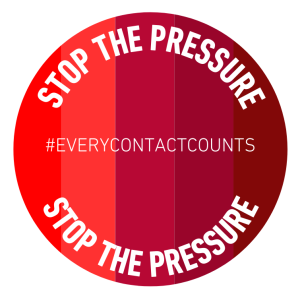News
Stop the Pressure Day 2023
Join us for Stop the Pressure (STP) Day, an annual event to raise awareness of the impact of pressure ulcers. #everycontactcounts

Pressure ulcers are among the major complications of spinal cord injury (SCI), and they are something you will be reminded of time and again.
It’s easy to become complacent about checking your skin daily, but the consequences of pressure ulcers can be serious. They can result in weeks or even months of bed rest and will cause much disruption to your daily routines, work and social life.
This year’s theme is ‘Every contact counts’ which focuses on all the different contact points an individual must be aware of.
- Every contact with a clinician, healthcare professional or carer can help prevent pressure ulcers
- Every contact with a bed, chair or other surface can help prevent pressure ulcers
- Every contact with leaders in healthcare can help prevent pressure ulcers
- Every contact on social media or traditional media can help prevent pressure ulcers
Pressure ulcers in patients with darker skin tones
As part of STP Day we are raising awareness of a campaign to improve pressure ulcer diagnosis for those with darker skin tones.

Cerina Howells, a Swansea Bay nurse is helping change the way pressure ulcers in patients with darker skin tones are dealt with to avoid unnecessary pain and harm. She has been reassessing the current processes around diagnosing and treating pressure damage in Swansea Bay and across Wales so that dark skin toned patients of all ethnicities are also included, and not just light-toned ones.
Cerina’s suggestions are now being discussed at an all-Wales level to make pressure ulcer care and wound care more inclusive across the nation.
At SIA we’re keen to ensure that this is something that is available in a consistent manner across England as well as Wales. Cerina spoke at our meeting of the All-Party Parliamentary Group (APPG) on 8 November and during the presentation identified some of the barriers that prevent early recognition of pressure damage in dark skin tones.
Let us work together to bring equity to pressure ulcer prevention and care in the UK by dispelling the idea that redness of the skin is the primary way of recognising early pressure damage, not all skins go red
Due to the lack of knowledge when it comes to early identification of pressure damage in darker skin Cerina believes many pressure ulcers are identified too late leading to unnecessary suffering to the patient and additional cost to the NHS. She highlighted how her own skin doesn’t go red so if she had the early signs of a pressure ulcer it could be missed and argued that if make up and fashion can recognise different skin colour, why can’t something as important as pressure ulcer diagnosis.
In recognition of her campaigning in Wales she has now been named as one of the health board’s first Florence Nightingale Foundation (FNF) Academy Fellows, to help develop her leadership and skills further via a mentorship programme.
We are supporting Cerina with this important and significant campaign to improve pressure ulcer diagnosis for those with darker skin tones throughout England as well as Wales.